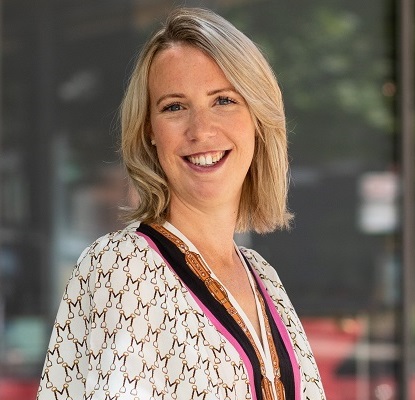
Q: Why did you start Mentoring Circle?
Vanessa Murray: It was borne out of personal experience, as there were very few women at senior leadership level when I was qualifying as a surveyor. I’ve worked with so many brilliant women who consistently find it difficult to promote themselves; as a result, female talent retention in property is low, and we lack women in mid- to senior-level positions.
During the APC, goals are very measurable and progress is structured. On qualifying, however, success often depends on an individual's line manager – and if she doesn't have a good manager then it’s very difficult to progress.
I was looking for opportunities to mentor women at this key stage after qualification, but couldn't find any schemes available that were free of charge. Existing initiatives were either targeted at school leavers, or at mid-level professionals who had been identified as rising stars and already had a network.
Q: How does the scheme work?
VM: The premise of Mentoring Circle is very inclusive. In short, the scheme is a free, cross-sector mentoring initiative designed to connect senior female property professionals to young women with a maximum of five years' post-qualification experience. It involves a quarterly one-to-one mentoring session with a single mentee over the course of 12 months, and is designed as a career kick-start. This is our first year, and to date we have 81 mentors, 22 of whom are at CEO, MD or board level, and we're growing every day.
As part of the scheme, we also host guest speakers throughout the year to tackle issues such as leadership, public speaking and imposter syndrome. In conjunction with networking events, there is a wrap-up event at the end of the year for mentors and mentees in one of London's landmark buildings to celebrate the conclusion of the intake.
The only requirement for mentors is ten years' experience in property after qualification. No previous mentoring experience is required either, as we provide free training for all.
Q: How can the scheme help combat imposter syndrome, identified as a common problem for women?
VM: First, having a senior mentor who can share her experiences is helpful because she can testify that everyone feels this way, no matter their age or stage of career. It's about being comfortable and authentic at work, and our mentors are well placed to help our mentees with this.
Second, the mentoring programme focuses on leadership, which is not about knowing everything but rather understanding what your strengths are and using them to your best advantage. The expert guest speakers I mentioned before supplement the mentoring, and together this provides tangible ways of addressing the challenges we face daily.
'The mentoring programme focuses on leadership, which is not about knowing everything but rather understanding what your strengths are and using them to your best advantage'

Q: What are the main areas employers should focus on, to remove barriers that prevent women progressing?
VM: Employers need to embrace a culture of diversity. There have been a lot of interesting studies to this effect: McKinsey has done a number, with the first in 2015 and the most recent in 2020. These show the strong correlation between diversity and financial performance. According to McKinsey, if you have women on companies' boards it creates a more balanced approach, reducing aggressive tactics and increasing talent retention.
The latter is one of the main things we're targeting. In property, there's around a 50:50 intake of men and women at graduate level, but at board level the percentage drops off a cliff. Of all the top 350 FTSE companies, 5% of board members are female. This means there are more UK CEOs called Peter than there are women CEOs, which is just unbelievable.
The best leaders are the ones who create an environment of psychological safety so people can be candid and bring their ideas. Leaders need to be able to make decisions and have a growth mindset so they are always learning and evolving. This means having a diverse workforce.
Q: How are you making sure this programme is intersectional, and cuts across class, race, sexuality and other characteristics?
VM: The scheme is free and available to all women working in property who meet the criteria; it is crucial to me that it is free for mentors and mentees, otherwise it loses its integrity. The whole purpose is to reach the people who need it the most. Eventually, I would like to be able to offer any young women in the property business a senior female mentor for a period of 12 months.
Q: Do you give mentors any key principles for mentoring?
VM: We put on training for the mentors every year to ensure we are clear about our expectations of the scheme. There are only four mentoring sessions over 12 months, so they've got to be worthwhile for the mentees. That said, we are not too prescriptive about each individual's mentoring style. Clearly, what each mentor brings to their approach is part of the joy of it.
Q: What good examples have you seen in the built environment of women being supported?
VM: New London Architecture created the Diverse Leaders Pledge to make the built environment more representative through career progression and advocacy.
Construction firm Parkeray aligns closely with Mentoring Circle's principles. Its staff are very good at going into schools and addressing preconceptions about gender in construction, and work hard at challenging the impression of the industry as being male-dominated.
Skanska has made a lot of high-ranking female appointments recently and is very forward-thinking. Furthermore, Savills has announced that as part of its wider corporate diversity targets it is setting an initial goal for the percentage of female directors in its UK business to increase from 20% to 25% by 2023.
Q: What are your plans for the future?
VM: My goal is to create a sustainable pipeline of female talent at senior level.
I'm working on a bespoke emerging leadership programme for all our mentees that will begin in 2022, which will support the knowledge imparted by mentors and expert guest speakers. I will seek sponsorship from companies to enable me to run the programme and make a positive, measurable impact in property.
Related competencies include: Diversity, inclusion and teamworking
